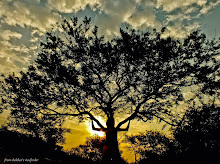Weapons of the Weak
The blogger went for a
second viewing of Vishal Bharadwaj’s Matru
Ki Bijlee Ka Mandola, two weeks after the first viewing. While previous opinions still stand true ( http://vichaarkhaana.blogspot.in/2013/01/mandola.html ) here are some additions to it.
Mandola
(yes, I absolutely refuse to call it MKBKM!) provides a crisp opportunity to observe
emotionally-wrenching depth conveyed with subtlety. When Bijlee goes looking
for Matru in the rain-washed, deserted village, she only shows him, from a distance, her freshly hennaed palms . Not a single word is uttered. The
sad-but-blank face of Anushka doesn’t even flinch. All the pathos of an unhappy
present and doomed future are spared their conversion to words and we are left
with just that one sight. That’s all.
Later on, when Matru is
packing his stuff to leave, Bijlee simply says, “I have started brushing in the
night”. No sentimental, mushy “I love you”-types expressing of love there. Just a simple dialogue, hinting at
the depth of attachment, belief and hope, binding these characters in an
unconventional yet romantic way. Economy of words has always been the forte of
the brains behind this film!
Finally, the thought
that did not leave my side since the very first viewing! Dialogues and actions
of the movie constantly reminded me of J C Scott’s “Weapons of The Weak”! This movie is an exercise in the display of
not just the arm-twisting tactics of the strong but also of the small stings that
are weapons of the weak. Here the haves do not have it all. The have nots do
not believe that what they have is insignificant in denting the haves, even if
minimally so.
An obvious example of
this was the usage of dung as cannonballs to disrupt ‘Operation Mao Mao/ Mow’. The villagers
may not be laced with technologically advanced options to counter the chemically-armed,
menacing son of the manipulating politician, but that did not prevent them from
devising a smart (even if stinky) plan to protect their lush crops from being
destroyed in the wake of midnight’s darkness. This was maximisng the usage of resources at their disposal, no matter how crude!
In their discussion
with the politician (representing the state that wants the land), Mandola (who
owns this land) and other officials (of the bureaucracy that will process this
deal), tillers indulge in ‘coercive bargaining’ (Guha 1987:2001) to get a
better price for their sacrifice (of land). Scott’s book demonstrates how…
In
Malaysia the state has become the main provider of valuable public goods but
has not succeeded in replacing the rural elites as patron at the village level.
Many of the material benefits distributed by the state are mediated by the
official party machine, which is controlled locally by landowning families
(Esmon 1987:311).
Similarly in Mandola, when Matru circumvents the village
patronage and attempts get a fair selling price for their wheat at the mandi (wholesale market), Mandola’s henchmen actively
intrude to prevent the sale from taking place. Strains of ‘coercive bargaining’
can also be identified in other (crisp) exchanges between Jalebi Devi and
Mandola, Mandola and Bijlee, Mandola and Matru, among others! In each of these
scenarios the ‘weak’ character plays his/her asset to their advantage while
bargaining for their personal benefits. The outcome of it may not always be entirely in
their favour, but that small foot in the door is not an insignificant gain either!
This has been a stellar comeback for VB who was showered with widespread criticism for his previous directorial venture, a movie both the Lady (http://dolcenamak.blogspot.in/2011/02/7-khoon-maaf-and-me.html) and me immensely enjoyed. In Mandola there shines the characteristic wicked
wit and sarcasm that comes from an evolved understanding of our evils. The ability
to communicate it with simplicity and deadpan humour is the forte of VB and
Gulzaar Sa’ab! Blessed are we to be living in the times that they are too!
References:
Scott, J.C. 1986. Weapons of the Weak: Everyday Forms of Peasant Resistance. Connecticut:Yale University Press.
Guha, R. 1987. Presentation
of Class in Everyday Life Weapons of the Weak: Everyday Forms of Peasant
Resistance by James C. Scott. Economic and Political Weekly. 22:47. pp. 2000-2002.
Esman, M.J. 1987. Weapons of
the Weak: Everyday Forms of Peasant Resistance by James C. Scott. The American Political
Science Review. 81:1. pp. 310-313.

Great post!
ReplyDeleteHi Blogger,
I am fascinated by the selection of biases reflected in the review, how you could see the whole set and context in layers, discreet strands of love, unskewed depiction of power split and more..
It is charming how you have embedded perfectly contextualised studies to lens up pithy parts making it a treat for someone with an eye for detail.
Looking up to more coming from you..
Keep writing!
hey Chillu...
ReplyDeletethanks for your comment! hope you'll be visiting again!